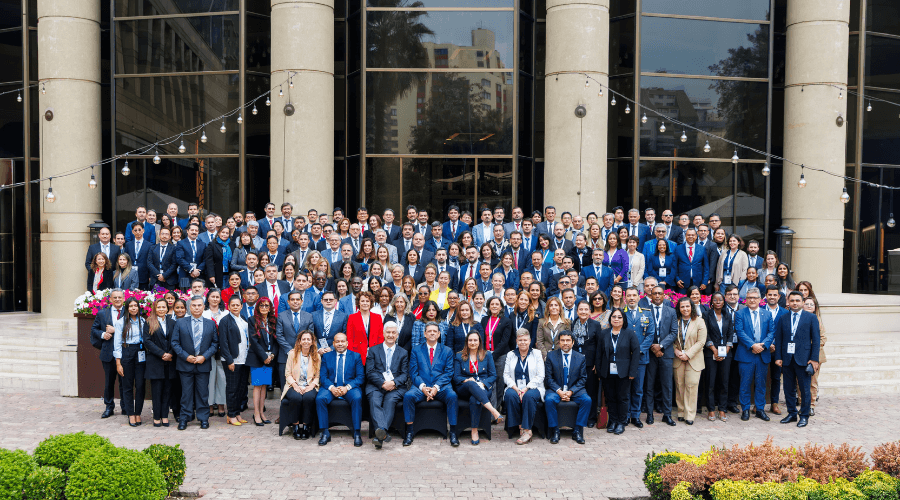CIAT 59th General Assembly

CIAT 59th General Assembly
The Role of the Tax Administration in Combating Tax Evasion and Tax Crimes.
Santiago de Chile, Chile, May 6 to 8, 2025
Presentations in PDF format of the main topics to be presented during the 59th CIAT General Assembly, as included in the technical program of the event. These can be consulted through the links indicating the available languages.
Subtopic 1: DETERMINATION OF THE POTENTIAL UNIVERSE OF TAXPAYERS AND STRATEGY TO ENSURE TAX COMPLIANCE.
Session 1.1: Estimation of evasion and its use in the determination of enforcement strategies.
Advances in the estimation of tax evasion and its use in the field of auditing – IMF (SP) (EN)
Estimating evasion based on operational audits and their use within the scope of the inspection – Brazil (SP)
Estimation of evasion using AI technology and its use in auditing – Korea (PR – Publication not authorized)
Session 1.2: Systems and programs to facilitate
compliance.
Use of the DEC tool in the POSS Project (Pacific One Stop Shop Solution) – Australia (PR– Publication not authorized)
DEC (Digital Economy Compliance) system to facilitate digital economy compliance – CIAT (SP)
Systems and programs to facilitate compliance. Pre – filled tax return proposals- Chile (SP) (EN)
Automatic VAT + Experiences in voluntary compliance facilitation programs: Preparation of the VAT declaration based on the information provided by taxpayers – Portugal
Subtopic 2: EFFECTIVE AUDITING
Session 2.1: Information to be collected for an
effective audit.
Capturing information for robust risk systems. The Indian Experience – India
Targeting Tax Evasion and Upgrading Queries (CFVR Project).– France (EN)
Abuse of the corporate form for the deduction of personal expenses and concealment of assets. – Spain (SP) (EN)
Use of information for audit purposes. A spectrum ranging from electronic invoicing
to CRS. – Costa Rica / CIAT
Session 2.2: Strategy for large companies: international companies and transfer
pricing, control of corporate groups,anti-avoidance rules, social tax
responsibility, etc.
Transfer Pricing: Overview of Latin America and the Caribbean and its challenges. – CIAT (SP)
Use of CBC for risk identification. – OCDE (SP) (EN)
Session 2.3: Differentiated strategy by economic
sector.
Experience in the control of the mineral sector – Peru (SP)
Experience in control of the hydrocarbon, lithium or other mineral exploitation
sector. –Bolivia (ES)
Experience in control by economic sector – China (PR – Publication not authorized)
Session 2.4: Control of new forms of digital commerce, payment methods and
transaction traceability mechanisms.
Fintech Companies and DeFi: A New Challenge for Tax Regulation –Spain (SP) (EN)
Taxation & gig economy.. – France (EN)
Control of crypto-asset-currency exchanges – BID (ES)
Session 2.5: Control of micro commerce and
strategies to address informality.
Control of underground economies. – Paraguay (SP)
Experience in the control of micro commerce and informality – Guatemala (SP)
Impact of Tax Audits on Tax Compliance.
Selective overview of the empirical evidence from administrative data –TARC
Subtopic 3: TAX OFFENSES IN FRAUD, CORRUPTION AND ORGANIZED CRIME.
Session 3.1: Research, detection and treatment.
Experience in investigation, detection and treatment of organized crime – Italy (SP)
Experience in investigation, detection and treatment of tax crimes. – Dominican Republic (SP) (EN)
Towards a strategy to tackle tax crime: some useful considerations – OCDE (SP) (EN)
Session 3.2: Horizontal collaboration for the exchange of information with other
agencies responsible for the subject (national and international).
Exchange of information to detect serious financial crimes. – Argentina (SP)
Case won in criminal proceedings by the Argentine states.. – CEATS (SP)
Fiscal police experience. – Colombia
